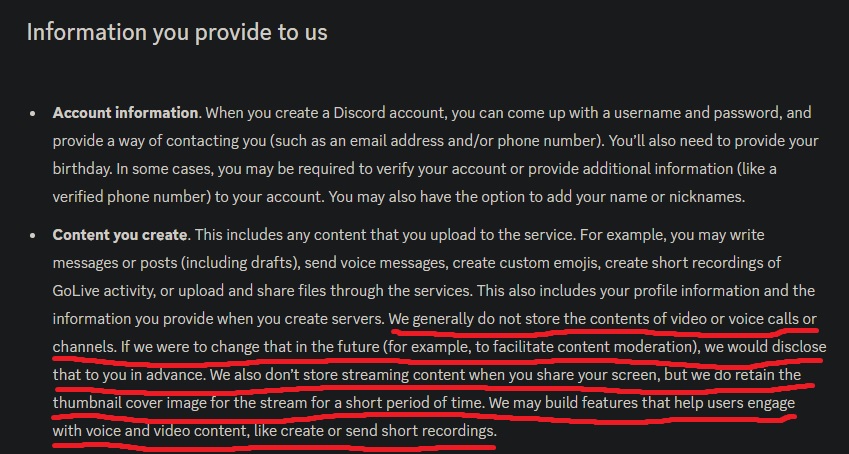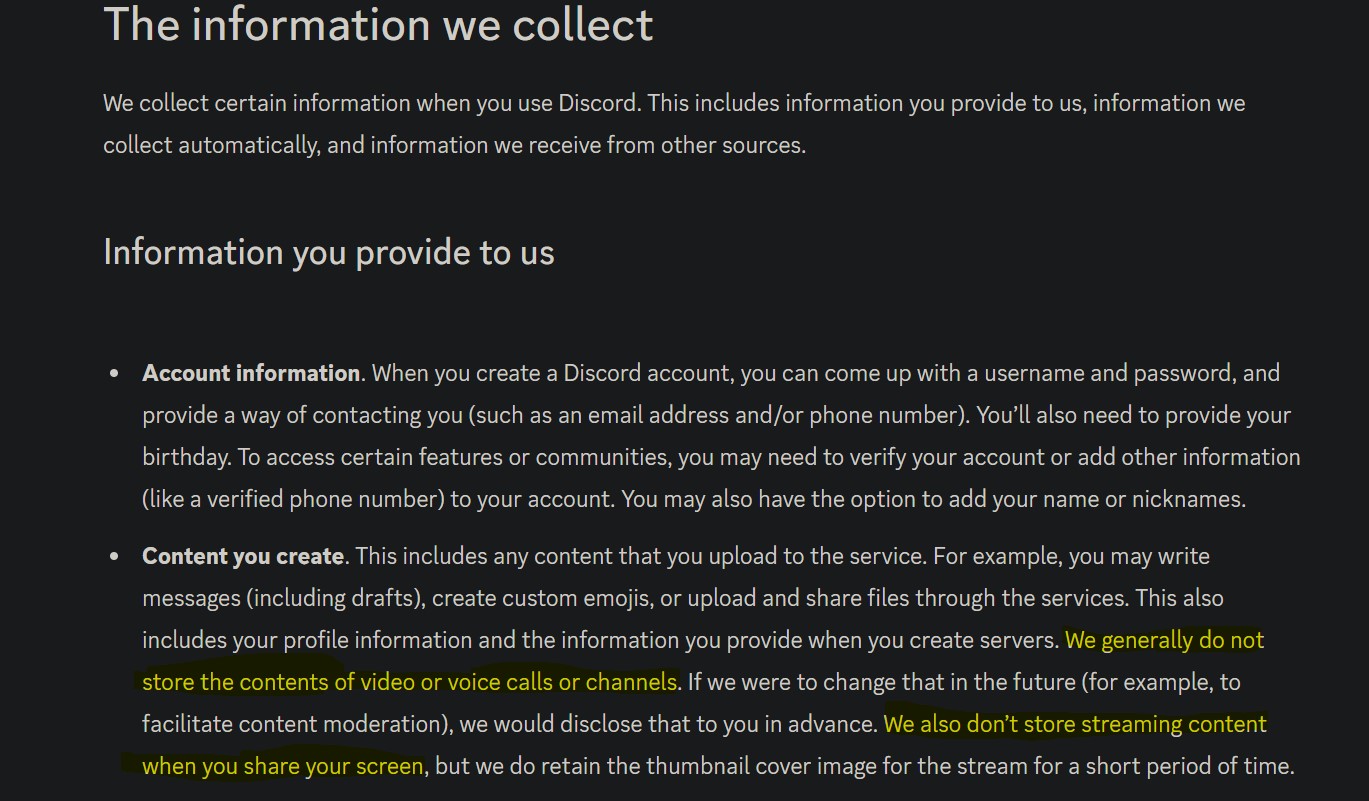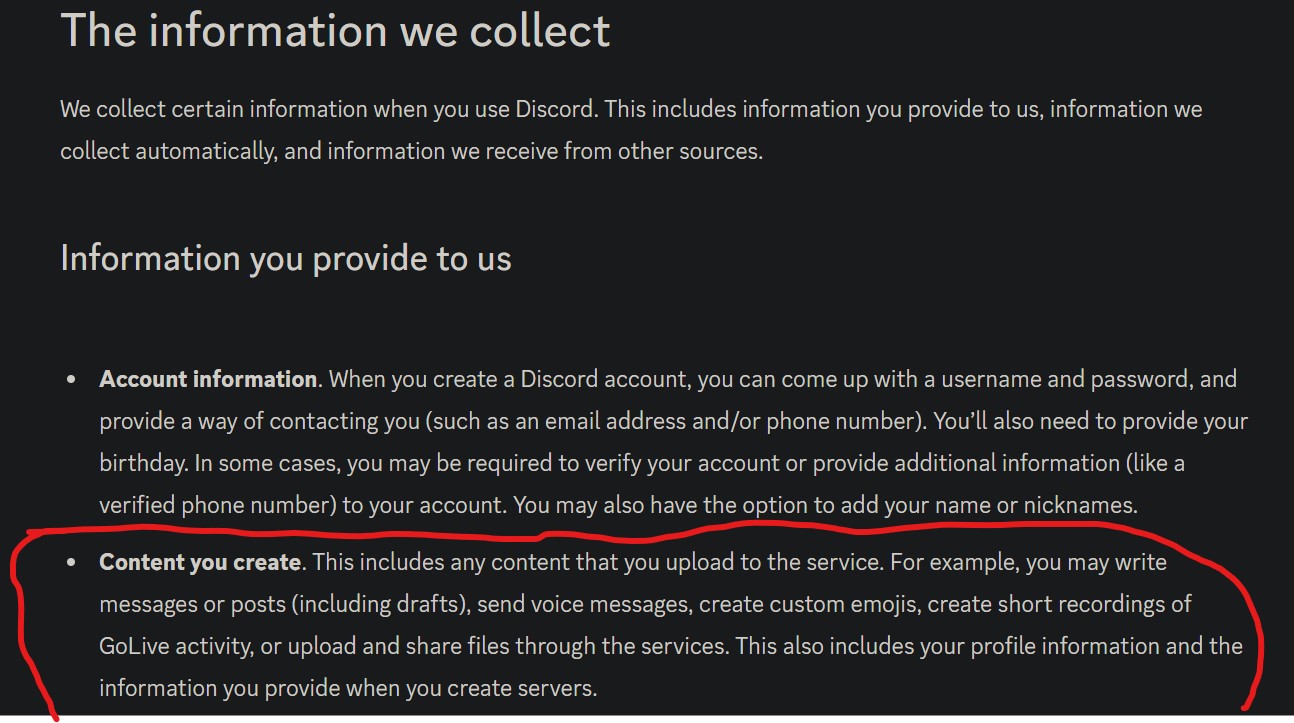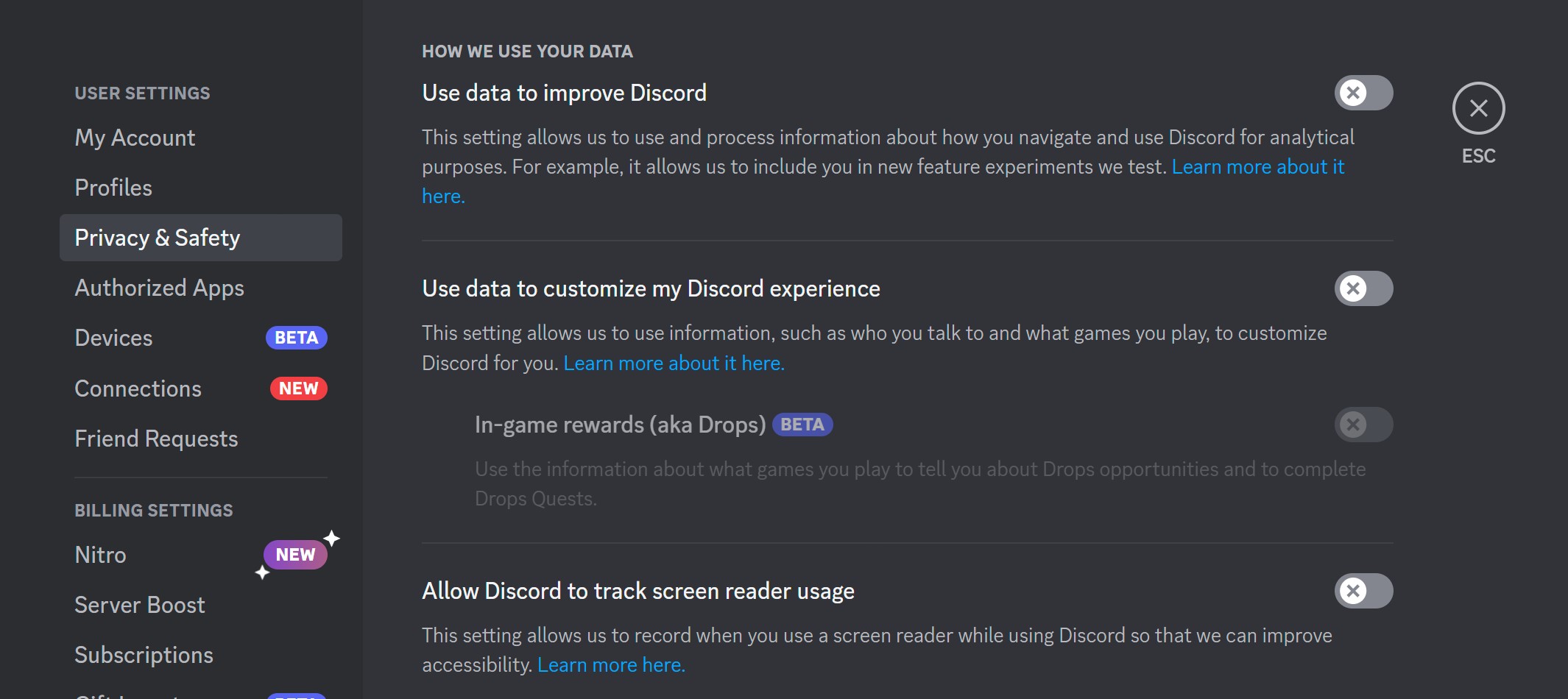Discord's AI features violate our privacy, and it's time we pushed back
Discord AI integration could become a privacy nightmare for users

Update: Discord has updated the Privacy Policy that will take effect on March 27, 2023, adding back the statements that were removed and adding in the following statement: "We may build features that help users engage with voice and video content, like create or send short recordings."
A Discord spokesperson contacted TechRadar to provide the following statement: "Discord is committed to protecting the privacy and data of our users. There has not been a change in Discord's position on how we store or record the contents of video or voice channels. We recognize that when we recently issued adjusted language in our Privacy Policy, we inadvertently caused confusion among our users. To be clear, nothing has changed and we have reinserted the language back into our Privacy Policy, along with some additional clarifying information.
The recently-announced AI features use OpenAI technology. That said, OpenAI may not use Discord user data to train its general models. Like other Discord products, these features can only store and use information as described in our Privacy Policy, and they do not record, store, or use any voice or video call content from users.
We respect the intellectual property of others, and expect everyone who uses Discord to do the same. We have a thorough Copyright and Intellectual Property policy and take these concerns seriously.”
In addition, the spokesperson asserts that if Discord’s policy “ever changes, we will disclose that to our users in advance of any implementation."

In a blog post released this past Thursday, Discord announced that it would be introducing several new AI features into its application: Clyde, AutoMod AI, Conversation Summarizes, Avatar Remix, and more.
These new AI features, which are powered by OpenAI technology, offer a host of services for Discord servers. Clyde can recommend playlists, answer questions, have extended conversations, and more. AutoMod AI will have expanded functionality, “harnessing the power of large language models” to alert mods of rule-breaking posts while keeping track of a conversation’s context. And finally, Conversation Summarizes will be gathering messages from chats to combine into a summary for those who’ve been away for a while.
In addition, Avatar Remix, an app “that lets friends remix each others’ avatars using the power of generative image models,” will now be open-sourced.
These and the many other tools Discord will be offering soon sound helpful. But quieter changes to the privacy policy as well as a deeper look at what these new tools have to offer paint a much different story. One that could result in some serious harm to Discord users.

Privacy issues galore
Could those works also be aggregated by other AI tools and then repurposed without credit or permission?
The biggest issue with this AI integration is the fact that it comes bundled with very deliberate changes to Discord’s privacy policy. The previous privacy policy, which is still in effect until March 26, 2023, had two important statements under the “The information we collect” section.
The first states that “We generally do not store the contents of video or voice calls or channels” and the second is “We also don’t store streaming content when you share your screen…” You can see the statements highlighted in the screenshot below.

But when you check the new privacy policy, which is set to take effect on March 27, 2023, both those statements as well as the one claiming that “If we were to change that in the future (for example, to facilitate content moderation), we would disclose that to you in advance,” are now completely wiped. You can see the affected paragraph, which has been circled, in the screenshot below.

This is important because it now means that any information that Discord collects is no longer protected from AI activity. Yes, I’m aware that the blog post was officially edited to state “that Clyde does not record, store or use any voice or video call data from users.” And no, that has no bearing on anything.
This is because that statement is completely misleading. The previous sentence states that “Clyde can only store and use information as described in our Privacy Policy,” which, you guessed it, redirects to the updated privacy policy. And this new policy has nothing in it that protects your data in any way, from Clyde or any other AI program Discord chooses to add to the service.
...the legally binding privacy policy itself would have been changed to reflect that, instead of leaving it to a mere blog entry.
And here’s a reminder that blog posts or other casual posts hold absolutely no legal weight when they directly contradict a Terms of Service, Privacy Policy, or any other legal document created by a corporation. This tactic of having a corporation’s blog post directly contradict its own legal documents, with the intent to obfuscate said documents’ true contents, was recently done by Wizards of the Coast in its failed attempt to overhaul its Dungeons and Dragons Open Gaming License (OGL).
By the way, this goes for AutoMod AI and Conversation Summarizes as well, since the sole purpose of those toolsets is to gather as many messages as possible in order to carry out their functions. And who’s to say what else is being done with that information?

Ramifications of privacy loss
This has the potential to be an absolute privacy mess for many reasons. Let me preface this by saying that under no circumstances should you be writing out messages, showing streams of you committing either criminal activity, or sharing private information on Discord. This is still an open internet service, and not sharing sensitive information through properly encrypted and protected sites like Signal is a bad policy.
But with this massive change to its privacy policy, Discord is now officially and very quietly stating that nothing you send, share, or upload is safe from AI aggregation. Because if it was, then the legally binding privacy policy itself would have been changed to reflect that, instead of leaving it to a mere blog entry.
And considering that many parts of the world (including the US) are stripping away civil liberties, this could have dire consequences. For instance, if you discuss either having or planning on having certain medical procedures that have been made illegal where you live through Discord, and the authorities are made aware of this and demand that Discord hand over any data that it collected through these AI programs, then according to Discord’s own policy it will do so immediately. And that now includes any data that is no longer under the protection of its privacy policy.
This data aggregation can also violate your privacy in other ways. All this new data that can now be collected from you can then be turned into data profiles and sold to third parties. This is, of course, something that Discord can already do, as it states that information it collects from you can be shared to vendors and related companies for its own business interests. But now it has a far larger pool of information to collect from – namely video chat, voice chat, streaming, and any other messages that the AI tools collect.
Or what if you and your friends are watching a show or movie on Discord’s video streaming service, and it’s through an illegal site? Now that Discord is collecting data from this avenue as well, it can share that information with the IP holders of whatever media you’re watching, which falls under its “To comply with our legal obligations” clause in the privacy policy. Once it shares that information, those same IP holders can now track down and prosecute these same websites, and even possibly hold streamers and viewers legally liable, depending on piracy laws in their countries.

Creative works at risk
Though the privacy violations are the most egregious part of this whole ordeal, there is another issue with one of Discord’s other new tools: the Avatar Remix app. AI tools have repeatedly come under fire for collecting artwork without permission and using it to generate images under the direction of a user.
And literally, the whole point of this app — which will now be open-sourced and therefore used even more than before — is to modify Discord avatars uploaded into it by using “generative image models.” What if your avatar is artwork you drew yourself or someone else drew? Is the AI pulling images uploaded into Discord servers?
There’s no way to definitively know this because this is reflected in Discord’s policies. All we can go by are past and current experiences with other AI image tools, and going by the rampant art theft and lack of artist protection in those cases, this is not setting a good precedent.
That’s not even covering the number of written works that are currently floating around in these servers. Could those works also be aggregated by other AI tools and then repurposed without credit or permission?

Final thoughts
This has the potential to be an absolute privacy mess for many reasons.
I truly love Discord and believe it to be one of the most important sites out there right now. Starting as a simple voice chat service for gamers and evolving into so much more, it’s become an integral part of many people’s lives and a way for people to communicate with others on a global scale.
I’m a part of quite a few Discord communities myself, including several writing ones, and I even run a creative server that encourages others to share their own art, writing, music, and edits with each other. But now those endeavors are in danger of being stolen, our very privacy in video and voice calls stripped away. The same features that gave us freedom of communication will now be monitored and collected.
Now, I would love nothing more than to be wrong about this. If this turns out to be a false alarm, I will take my L in peace. But seeing how tech companies time and again will betray their user bases for a quick profit, I can’t see myself being anything but right. Especially since this isn’t even Discord’s first time trying to make bank on a grift – like that time when the founder and CEO Jason Citron tried to push NFT integration on the platform before backing down after user backlash.
All I can advise at this moment is to go to your Privacy settings right now and change them. Go to “User Settings” at the bottom of Discord to the right of your avatar. Then hit the “Privacy & Safety” on the left side and opt out of all the “How We Use Your Data” settings there. You can see the menu in the screenshot below.

Get daily insight, inspiration and deals in your inbox
Sign up for breaking news, reviews, opinion, top tech deals, and more.

Named by the CTA as a CES 2023 Media Trailblazer, Allisa is a Computing Staff Writer who covers breaking news and rumors in the computing industry, as well as reviews, hands-on previews, featured articles, and the latest deals and trends. In her spare time you can find her chatting it up on her two podcasts, Megaten Marathon and Combo Chain, as well as playing any JRPGs she can get her hands on.